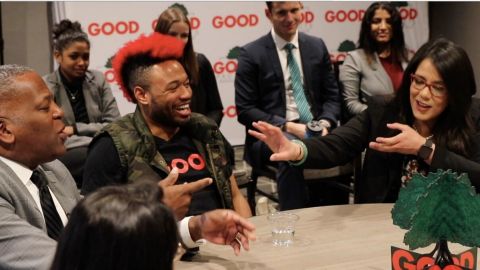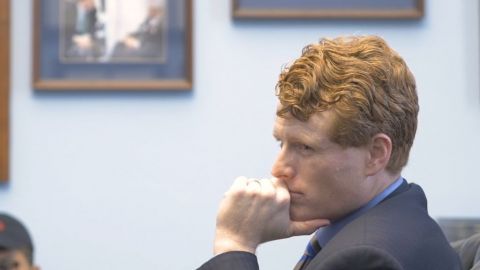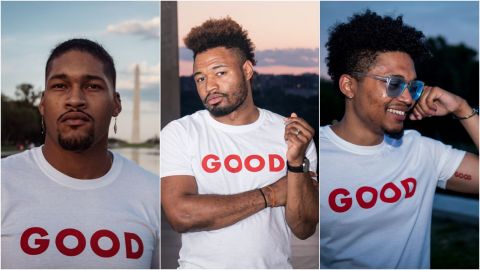Actor Richard Gant and his daughter Dakota sit down with the hosts of GOODTalks to discuss what the American Dream means for African American today. Richard Gant’s life work has been centered around bringing together the African Diaspora through the arts. He explores the systems of incarceration and poverty that often keep African Americans trapped and how he’s found empowerment through his roots.
You say we're the American
Dream?
Yes you're the American Dream.
Finally somebody sees it.
[Laughter]
How could you not be?
[music]
Hey I'm Troye
This is Darius.
And that's Danny.
We were college roommates and
played football at Georgetown.
During college, yeah we threw a
lot of parties, but at the same
time we were out in the
community doing good.
Our senior year, we met a guy
named Frank Luntz.
You might know him.
You might not.
But he's a very big political
strategist.
We started working with him and
he challenged us to take our
experiences growing up in DC and
go out into our community and
make a difference.
At the time, we would have never
have guessed we'd have grew GOOD
and raise millions of dollars,
and make a huge impact where we
live and work.
Darius, he's the one who's not
afraid to speak his mind.
He knows everyone.
Me, I'm super empathetic.
I'm in touch with the community
and I know how to get things
done.
Danny, he's the go-getter.
When we talked about the idea of
starting GOOD in college.
He came home the next day to our
dorm and said, "Hey guys I filed
the paperwork." Along the
journey, we linked up with the
good people at Chasing the Dream
and they challenged us to go out
and explore the authenticity of
the American Dream.
And this, this is what we found.
Chasing the Dream!
Minus one.
Next episode, we got my man
Richard Gant.
How did we find Richard Gant?
Did you find him?
Did Darius find him?
I don't know.
We can't ask him, he's not here!
[Laughter]
Nah, it was at the Milken
Conference.
Oh!
He was walking around like, I've
definitely seen him in some
movies.
Oh, he's been in a lot of shows
and TV series.
When did he debut, in the 80s?
1980 was his first.
See?
So there you go.
That's about 40 years being in
the industry.
He's seen it all.
The American dream for him
definitely has to have changed.
Yeah.
Also, I think we're scheduled to
have his daughter, too.
If we have his daughter, we can
definitely flip that, as well.
Yeah.
Like, how does the American
Dream feel different, you know,
being the daughter of an actor.
Yeah.
Yeah.
And does she even have like an
American dream because is she
already living it?
I wonder if for him, does it
feel different?
Like, at this point in time,
does it feel like the American
dream is different for you, or
does it just feel like you're
just living your reality?
Or has he even realized what
the American -- the new American
dream is for young black men
like ourselves?
Maybe we could teach him
something, you know?
You never know.
Hey, we are the American
dream.
Exactly.
So Richard, you look good for
75, man.
You've got your beautiful
daughter here....
He's not 75.
[Laughter]
1944.
I did my research.
Google always lying, you know
that.
1944.
1944.
I'm not counting your clock by
any stretch Richard...
But you're now also telling the
audience something they might
not know...
But I'm saying, as you start to
get up and you are starting to
see a lot of your friends go
that you came up with, how do
you stay motivated?
Like you talked about, 'Hey, I'm
still working on new projects.'
But that's it
you know.
There's an excitement about what
I'm doing now, you know.
Yes, I'm in the arts.
Yes, I have a life in the arts.
Yes, I'm on stage.
Yes, when I kick out of here, I
probably hope that I'm on stage,
you know.
But I'm also...
Yes, you were in Rocky.
You know, I've had a good
career, but the other things
that I'm doing.
When I first stepped foot on
stage, it is because of Langston
Hughes.
I was introduced to Langston
Hughes in a theater class, a
black literature class.
Then I was introduced to Wole
Soyinka, a Nigerian playwright,
and that became my passion then,
to get black Americans and
blacks from the diaspora in
Africa together on stage as part
of production.
And that's become my life's
work.
What was it for you?
Like to say, 'I want to be
great.'
Cause, as I'm sure you know,
there's a lot of people that
even you grew up with, and
there's people that we surround
ourselves with that we're trying
to pour into them every day.
'You can do this, you can do
that.
You can be anything you want to
be.'
And it goes in one ear and out
the other.
But you made that decision at
some point in life to, 'Hey, I
want to be Richard Gant!'
I mean I was always doing
something, there's no two ways
about that.
I was either the president of
the junior choir at church, or
the usher boy, or something
always.
Then in the service, I was in
the NAACP there in whatever
little town that I was in.
kind of a thing
But when I got out, got back to
school, I was at Merritt
College, and I joined a Black
Literature class, you know.
Stepped foot on stage for the
first time and realized that's
where I was supposed to be
Dakota, what was it like for
you, you know, growing up,
watching this guy do his thing?
Ah
People have been asking me for
the past few days, and I really
don't have a good answer, like I
don't have another dad.
[Laughter]
Like what is it for you?
Nothing to compare it to.
I don't have anything else to
compare it to, like I don't know
what it would be like to not.
It's pretty cool!
[laughter]
The weirdest thing is like comis
like hearing him and I'm
thinking he's in the living
room, and its.. he's on TV.
And I'm like 'Oh!
Okay!'
[laughter]
we just came back from Ethiopiad
Ethiopia this past Christmas.
Ethiopia blew my mind.
[laughter] Then we go back to
Addis Ababa and we see the
bones...
we see Lucy's bones.
Lucy, the first person, the
first woman.
What do you mean the first
person?
Like the first person ever.
I learned about that in our
history.
Lucy, yeah.
What?
Yes, but see that's not the
killer.
The killer is she's black.
So what does that do to you?
What does that do now to your
dreams?
Of who you are, and what you can
be and want to be.
In our work and the community
we work in, do you think that
that seeing Lucy's bones or expg
that to the kids that are in our
programs would change their
mindset?
Hell no.
No, I'm joking.
I don't know.
[laughter]
well
For the younger kids
maybe
For the older kids, I think
they've experienced such traumas
and et cetera that they wouldn't
be able to appreciate it at that
point.
I think some of them are too far
gone in a sense, with their
experiences, where their head is
at, or what the American Dream
could be to them honestly and
what the world is that they
wouldn't be able to appreciate
it at that point.
I think the American Dream, in
all senses that you've been
describing, is about expansion.
Like economic expansion,
expansion of self knowledge,
expansion of the mind.
So like, most of this stuff, if
you were to take children to see
Lucy or whatever, it's expanding
their mind and taking them out
of whatever construct they've
been placed in, right?
So it's really about like, you
know, you see Lucy, but what
does that do for who you are?
Like what does it spark in
you?
What does it spark, exactly.
So even if you feel like you may
be too far gone, what it fixes
in you when you realize that you
are more than your experiences,
you are more than what happened
to you or your trauma or
whatever.
That is the American Dream.
It's interesting you say that
because when we first started
this work working with our
juveniles, you know, I used to
tell them all the time, you
know, you're bigger than your
situation.
Like you come out of the system
as a 16 year old, your
right
your commitment is over and nowu
write a book on how you're
changing your life.
I'm like some of these agencies
that would have locked you up
or these court systems that woup
now will pay you to talk to oths
about how you got out and how
you changed your life.
If you're just a normal African
American boy that's living every
day going to a bad school, not
really knowing what to do, not
much support at home, I think
you're less likely to be
successful, have trajectories
than somebody
who is coming
out of the prison system
who just served a long sentence
for drug offenses because that
person has more attention and
more resources that are going to
be focused on them when they
return home.
I think you're absolutely right.
But by the time we help you,
we've already taken away half of
your civil liberties.
It's almost like a dependency
thing too is that the system is
almost setup as if I'm coming
out of these communities, I want
you to be dependent on me to
make it out.
So you've now went into the
prison system, you can only get
certain jobs, so now let me come
in and kind of be your savior
and be helpful for you.
Where we're not setting up a
system where people can be
self-sufficient, can be
independent.
And that's really troubling.
And I think that's why we always
say us three are the exception
to the rule because at the end
of the day, we went the normal
trajectory.
We were poor in a messed up
situation in a messed up
community, and we fought through
and did the right things and got
into private school and got into
one of the top universities in
the world and graduated and did
our thing.
Well, but it's a system and how
do you break out of the system?
How do you recognize that you're
in the system and can break out?
You have to recognize that
you're in the system.
Yes but, so you've identified
this particular problem, a
regular kid.
What's his trajectory?
How does he project?
And where is the help for him?
But I contend that the system is
more pervasive than even that.
I mean you go to school, right?
You come out owing from 40 to
120-thousand dollars.
And so you're already in the
system.
Then maybe the American Dream
should really be called the
American Standard?
Right?
The American Standard is you end
up in the system where you have
a job, you're in debt, and
you're just continuously paying
bills, and that's your life
trajectory.
And yeah you have the
opportunity to shift, and to go
from here to there and industry
to industry and career to
career, but at the same time,
you're still gonna be in that
debt system unless you become
richer somehow.
I would say that the color of
your skin still factors into
your ability to obtain that
dream.
But I think that I'm really
naive in the sense that even as
a black man, like growing up in
this generation, I feel like
there's nothing holding me back.
Honestly.
It's the generation.
We're privileged.
But we're privileged because of
our knowledge and our education.
Yeah, that's why we're
privileged.
There's levels of privilege.
You have privilege because of
your wealth, you have privilege
because of your education -- You
have privilege because of your
skin color.
Because of your skin color,
because of your access.
There's different levels to
privilege.
And so you go to a top
university, more than one
percent of the world haven't had
that privilege of receiving that
level of education or access.
Yeah but how about the notion
that because I'm
African-American things are
better for me.
Simply because that's how I
think, and that's how I approach
the world.
And I think that's an attitude
that those people who have a
positive spirit need to have:
Because I am this, I am that.
I believe it's about spirit.
I swear to you.
If you can some kind of way
believe that other things are
possible, that I am greater
than, or that there's other
kinds of things out here other
than what everybody is talking
about, I believe that's it for
me, you know.
And I believe that's my mission.
You say we're the American
Dream?
Yes you're the American Dream.
Finally somebody sees it.
[Laughter]
How could you not be?




















